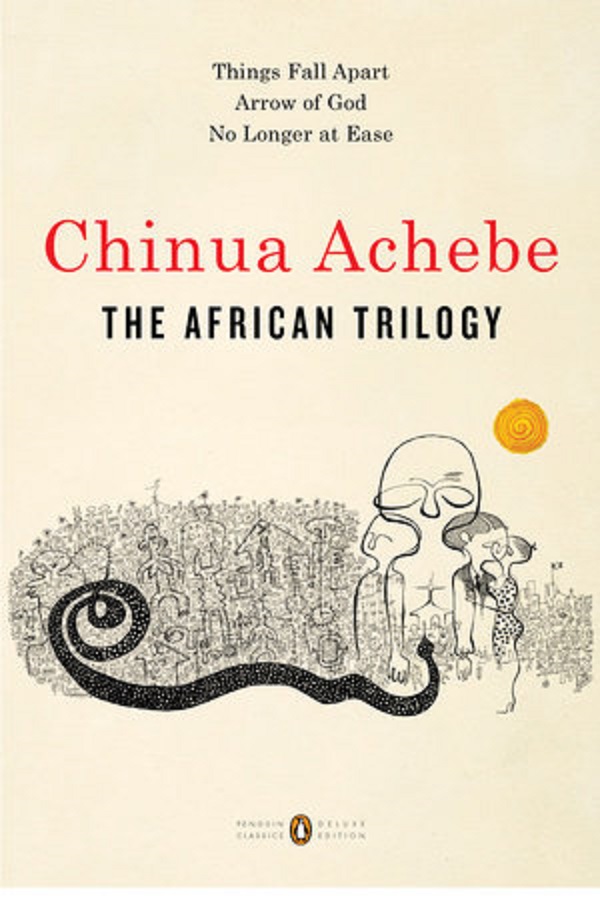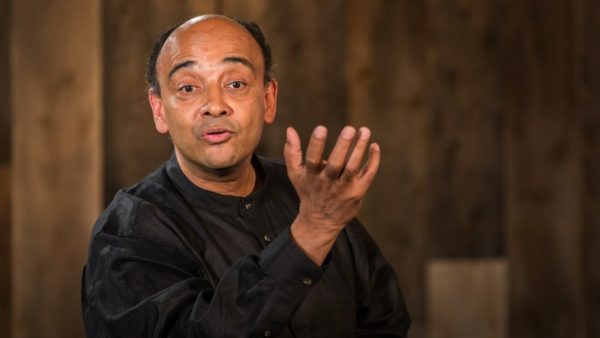
So much has been said about how Chinua Achebe’s first three novels—Things Fall Apart (1958), No Longer at Ease (1960) and Arrow of God (1964)—constitute a trilogy charting the response of three generations of the Igbo society to colonialism. Okonkwo’s story in the first novel is set in the 1890s, at the beginning of colonial intrusion. Ezeulu’s story in the third novel takes place in the 1930s during the British experimentation with warrant chieftaincy in Igboland. His grandson Obi Okonkwo’s story in the second novel happens in the 1960s, in the newly independent Nigeria.
The novels were first collected in 2010 in Everyman’s Library Contemporary Classics Series and published by PenguinRandomHouse. Titled The African Trilogy: Things Fall Apart, No Longer at Ease, and Arrow of God, its introduction is by Chimamanda Ngozi Adichie. A new 2017 deluxe edition, Chinua Achebe: The African Trilogy, has been released by Penguin Classics and it comes with a foreword by the Ghanaian philosopher, cultural theorist and novelist Professor Kwame Anthony Appiah.

Professor Appiah is a leading authority in political and moral theory, the philosophy of language and mind, and African intellectual history. Formerly the Laurance S. Rockefeller University Professor of Philosophy at Princeton University, he currently holds appointments at the New York University’s Department of Philosophy as well as the university’s School of Law.
Here is an excerpt from The New York Review of Books adaptation of his foreword.
*
The genius of Chinua Achebe, like all genius, escapes precise analysis. If we could explain it fully, we could reproduce it, and it is of the nature of genius to be irreproducible. Still, there has been no shortage of attempts to explain his literary achievement, an achievement that starts with the fact that Things Fall Apart (1958), the first of the novels in his “African trilogy” defined a starting point for the modern African novel. There are, as critics are quick to point out, earlier examples of extended narrative written in and about Africa by African writers. Some of them—Amos Tutuola’s Palm-Wine Drunkard (1952), Cyprian Ekwensi’s People of the City (1954), to name but two also written by Nigerians—remain eminently worth reading. But place them beside the work of Achebe and you will see that in his writing something magnificent and new was going on.
One reason for this, which often passes without notice, is that Achebe solved a problem that these earlier novels did not. He found a way to represent for a global Anglophone audience the diction of his Igbo homeland, allowing readers of English elsewhere to experience a particular relationship to language and the world in a way that made it seem quite natural—transparent, one might almost say. Achebe enables us to hear the voices of Igboland in a new use of our own language. A measure of his achievement is that Achebe found an African voice in English that is so natural its artifice eludes us.
The voice I am talking about is, first of all, the narrative voice of the novel. Consider the scene, early on, when Okonkwo, a young man whose father has left him no inheritance, has come to ask for the seed yams he needs to begin his career as a farmer. Custom requires a general conversation before Okonkwo can turn to his business, and in the course of it someone tells an amusing story about a palm-wine tapper whose father, like Okonkwo’s, was poor. “Everybody laughed heartily,” Achebe writes, “except Okonkwo, who laughed un- easily because, as the saying goes, an old woman is always uneasy when dry bones are mentioned in a proverb. Okonkwo remembered his own father.” The point of view here is Igbo, but Achebe has allowed us to inhabit it.
This invocation of shared proverbial wisdom is also found in the direct speech of the characters. Okonkwo’s father, who is always greatly in debt, explains a little earlier in the novel why he cannot repay a loan to a friend who needs his money back. “Our elders say that the sun will shine on those who stand before it shines on those who kneel under them. I shall pay my big debts first.” As someone who has struggled over the years to translate proverbs from my father’s Asante language, I know how hard it is to make this proverbial way of speaking, this traditional form of argument, available in English. In these novels, both in the direct speech of Igbo characters and in the voice of the novel itself, we come to understand, appreciate, and accept the naturalness of this mode of speech and of thought. This allows us to enter an unfamiliar world as if it were our own. As James Baldwin put it: “When I read Things Fall Apart which is about…a society the rules of which were a mystery to me, I recognized everybody in it.” It is a mark of Achebe’s success that many of the African writers who followed him took up his way of representing the speech-world of their own societies.
Read Kwame Anthony Appiah’s “The Achievement of Chinua Achebe” in The New York Review of Books.









COMMENTS -
Reader Interactions